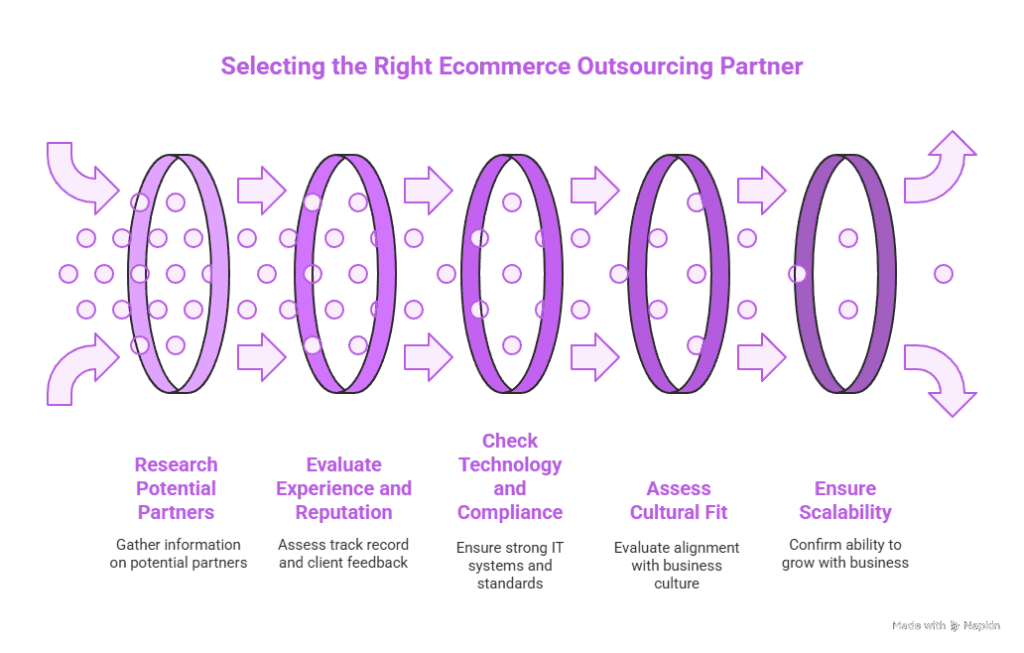Best Practices for Outsourcing Tasks for Your Ecommerce Business
14 Jun 2024 By: Mary Dellosa
Updated
Many companies now use ecommerce outsourcing to stay ahead in a busy market. Experts handle tasks, so teams focus on core work and save time. To gain real value, they must follow best practices and make smart choices.
Understanding the Basics of Outsourcing Ecommerce Business
Ecommerce outsourcing means giving key jobs to outside pros. This approach improves efficiency and reduces expenses through the use of specialized skills and tools. Typical jobs handled this way cover things like customer service for online stores, processing orders, tech assistance, online promotion efforts, and building websites.
Outsourcing for ecommerce makes a lot of sense. Companies can stick to their main strengths that way, while pros take care of the other parts. Operations run smoother overall, and that pushes forward expansion. For instance, businesses managing large product inventories often benefit from integrating a warehouse management system (WMS) with their outsourced operations to streamline order processing and inventory tracking. Firms end up doing better with quicker processes and fresh concepts coming in.
Businesses turn to ecommerce outsourcing for solid reasons. We can look into what drives this practical decision.

Identifying Your Outsourcing Needs
Before starting ecommerce outsourcing, assess your business to find tasks experts can do better. It simplifies work and boosts focus on key strengths. This method cuts costs, uses expert skills, and speeds up growth.
What Are the E-Commerce Functions That You Can Outsource?
Check how much time, effort, and money each task takes. Choose jobs that eat time, need skill, or aren’t core. These are ideal for ecommerce outsourcing. Focus on key but non-core work like data entry, IT help, content writing, and payroll. This frees your team to drive growth and fresh ideas.
Use ecommerce outsourcing for support, orders, accounting, and marketing. Try marketing tools to automate and track your campaigns. If building a Roposo-like app, these tools help create personal and engaging features. This way, you can focus on what makes your business grow.
Setting Your Ecommerce Outsourcing Goals
Effective outsourcing really kicks off with having clear goals right from the start. You might aim to save money in the process. Or perhaps improve the overall quality of your work. It could even mean providing customers with a much better experience in the end. Set those expectations clearly from the beginning. Track how things are going by using key performance indicators, which people often call KPIs. No matter what your main focus happens to be. Whether that means boosting efficiency across the board. Or reaching out to more customers than before. Or simply improving the service you offer. Having specific targets in place will guide the whole outsourcing effort. They help make sure you actually see some real benefits come through.
Choosing the Right Ecommerce Outsourcing Partner

You figure out what parts to outsource already. Now hunt down a solid partner for the job. Your whole success rides on selecting someone dependable. They need to grasp your main goals right from the start.
The right ecommerce outsourcing partner cuts down on costs quite a bit. They deliver those expert skills you might lack. Operations get smoother and more efficient overall. You end up putting your energy into the areas where you shine most. Always dig into solid research before deciding. That way you land on a partner who follows through on commitments. They help push your business to grow steadily. Think about outsourcing the build for your custom ecommerce store. Focus on partners with a real history of success. They create solutions that users find simple. Those setups scale up easily as needed.
Evaluating Potential Outsourcing Ecommerce Partners
When you start hunting for possible partners, think about their background first. Look at how much experience they bring to the table. Check their reputation in the field. See if they can really handle what you require. Pick ones that have teamed up with businesses just like yours before. They should show a clear history of getting results.
You also want to examine their tech side of things. Look into the infrastructure they use. Make sure they stick to all the standard rules in the industry. The right partner comes with solid IT setups in place. They put a lot of effort into protecting data. And they have real know-how in planning data strategies. All that helps keep operations running without hitches. It cuts down on potential problems too.
Get into some solid digging on your end. Run background checks where you can. Reach out for references from their clients. Go through any reviews that are out there. Drop by their actual sites if possible. Or arrange some online chats instead. Either way, it gives you a better feel for their daily routines. You learn more about the kind of culture they have.
Key Factors to Consider When Choosing a Partner
People tend to focus on a few basics when selecting an ecommerce outsourcing partner. You really should consider their location along with language skills and cultural fit. Communication matters a lot too, not to mention data security and their ability to grow alongside your business. Make sure they align well with what your company requires. They need to handle your ecommerce operations without any major issues.
Scalability plays a big role in all this. Business demands can shift over time in unexpected ways. That is why you want a partner capable of expanding as you do. A flexible one makes it simpler to adjust to new market conditions and evolving needs, especially as operational responsibilities such as taxes become more complex in a growing e-commerce business.
Managing the Outsourcing Process
Once you choose an outsourcing partner, managing the process well is key to success. Set up clear communication channels and strong monitoring systems.
Dive into the details of managing the ecommerce outsourcing process to ensure smooth collaboration. Focus on communication, cultural fit, data security, and legal compliance to make the partnership work.
Establishing Effective Communication Channels
Clear and honest talk is key in ecommerce outsourcing. Set goals and share what you expect from the start. Use KPIs to track progress and set reporting rules. Stay in touch often to keep things clear. Solve issues fast and give regular feedback to build trust.
Create a simple plan for team talk. Add check-ins to review progress. Share updates right away. Set rules for handling big problems. Make sure both sides talk and listen. This boosts teamwork and makes the process smoother.
Monitoring and Evaluating Performance
Check your ecommerce outsourcing partner’s work using KPIs and SLAs. This helps fix issues early and keeps the partnership on track.
Use team feedback and customer surveys too. These give a full view and help improve the work over time.
Why Businesses Choose to Outsource
Companies pretty much always look at outsourcing as a way to trim their budgets. This approach cuts down on the costs of bringing on new hires and getting them up to speed for jobs that are not right at the heart of what they do. On top of that, it gives firms a chance to pull from a global lineup of experts. They end up with access to unique abilities that just are not around in their own backyard, which boosts the overall work quality and sparks some fresh thinking.
Outsourcing really aids businesses in saving cash, growing their operations without hitches, and holding their ground against rivals. When firms pass off those side tasks to outside specialists, they trim down on the expenses for recruitment and employee prep. They also adjust faster to shifts in customer needs and pull in experts from anywhere globally. That kind of strategy pulls in innovative thoughts and proven methods, helping keep companies flexible and quick to react in a market that changes rapidly.
Let’s compare the amount you’ll spend for In-house assistants vs. Outsourced assistants:
Trending Now
In 2024, e-commerce outsourcing helps businesses stay competitive by accessing global talent, reducing costs, and focusing on core activities. It streamlines operations, enhances customer support, and manages inventory efficiently. Outsourcing also provides scalability and 24/7 availability. By setting clear goals, ensuring data security, and maintaining open communication, e-commerce businesses can optimize workflows and boost profitability.
E-commerce outsourcing also helps businesses thrive by accessing global talent, reducing costs, and focusing on core activities. It streamlines operations, boosts customer support, and efficiently manages inventory. By setting clear goals, maintaining open communication, and leveraging technology, businesses can enhance efficiency and growth. Outsourcing partners offer specialized skills and flexibility, ensuring companies stay competitive and responsive to market changes.
Mitigating Risks in Outsourcing Ecommerce Business
Outsourcing has lots of benefits but it also comes with risks. If you want to succeed, you have to understand these risks and strategize to be well-prepared.
Common Risks in Ecommerce Outsourcing
Outsourcing can boost your business, but it has risks. In ecommerce, you might face data breaches, intellectual property theft, communication gaps, quality issues, and over-reliance on one vendor. It’s vital to understand and address these risks to keep your business safe.
Strategies to Mitigate Outsourcing Risks

To reduce risks when outsourcing, try these strategies:
- Choose vendors with strong data security measures.
- Create clear legal agreements to protect your intellectual property.
- Set up effective communication channels to prevent misunderstandings.
- Regularly check vendor performance using defined metrics.
- Diversify your outsourcing partners to avoid relying on just one.
To minimize risks and maximize the benefits of ecommerce outsourcing, verify vendor data security by checking certifications, reviewing their history, and visiting their facilities. Ensure clear legal agreements to protect intellectual property by defining ownership, usage rights, and dispute resolution methods, and consult legal experts for robust, enforceable contracts.
Effective outsourcing relies on strong communication, building collaborative relationships with vendors, and offering support. Regularly refining communication and monitoring vendor performance against set metrics ensures quality control and addresses issues quickly. Diversifying your outsourcing partners reduces risks by spreading tasks across multiple vendors and locations, minimizing dependence on a single source. Using these strategies can reduce outsourcing risks in e-commerce and ensure long-term success. Partnering with an experienced e-commerce SEO agency can further support sustainable growth by aligning your outsourcing efforts with search visibility and performance-driven marketing strategies.
Ready to boost your e-commerce business with expert outsourcing? HelpSquad Health has you covered. Our dedicated, bilingual agents are available 24/7 to provide top-notch customer support, handle back-office tasks, and conduct thorough research, all for just $9.00 per hour. Elevate your operations and customer satisfaction with HelpSquad Health. Start your trial today and see the difference our professional virtual assistants and customer service team can make.


